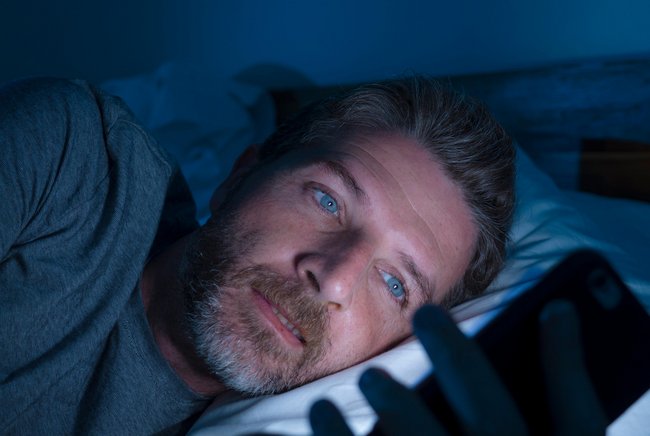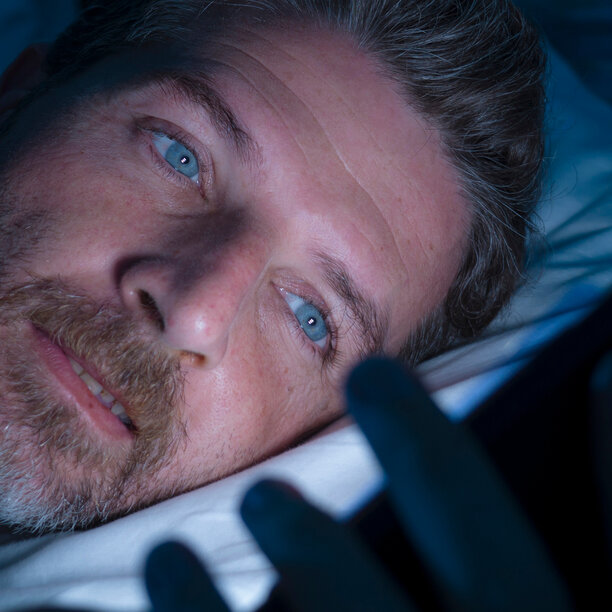This is how your phone keeps you awake
New research insights on screen use, light and sleep

It seemed perfect: the blue-light filters which suddenly appeared on all computers and smartphones. You press a button, and your screen light takes on an orange hue, so that nighttime screen use no longer keeps you from sleeping. But recent US research on the blue-light filter on smartphones indicates that it is actually not very effective. Does this mean you shouldn't use screens at all at night if you want to sleep well? Fortunately, no! Under the right circumstances, screen use can even help improve your sleep, Dutch research shows.
Smartphones and computers have a bad reputation when it comes to a good night's sleep. Most of us have probably experienced that you fall asleep less easily if you use those devices all evening. This effect is confirmed by several studies. The manufacturers of these devices have also realized this, so they have sought a solution based on scientific knowledge.
It is self-evident that the solution was sought in the light as emitted by the screens. Humans use light not only to see, but also to regulate our biological clock. Our eyes contain special receptors for daylight. If they pick up a lot of daylight, a signal goes to the brain that it's daytime and you should stay awake. When it gets darker in the evening, your body starts producing melatonin and you become sleepy. Light exposure during the evening and night disrupts the natural production of the sleep supporting hormone melatonin. The daylight receptors in the eye are very sensitive to blue light. However, these receptors are also sensitive to white light, because it contains all colors. The advice is therefore to limit your light exposure, especially your blue light exposure, during the last two to three hours before you go to sleep. A good idea, then, to filter that blue light out of your screen at night, you might say.
More at play
So why is it that researchers found no effect when a group of young adults used night shift, the blue-light filter on their iPhones? Luc Schlangen, researcher at Eindhoven University of Technology, can think of several causes.
First, the type of activity you engage in on your phone makes a lot of difference. Do you use your phone to relax or is it perhaps a source of stress? A study with Laura Huiberts, shows that watching TV before going to bed can be supportive for sleep while pre-bedtime use of social media can compromise sleep. Huiberts explains: "Compared to watching TV, social media also has a more addictive effect; the online platforms constantly stimulate you to keep using it longer by offering new personalized content. This simply makes you more inclined to push your bedtime forward, reducing your overall sleep duration. In addition, it can cause a certain level of mental alertness (arousal) which makes falling asleep more difficult." Of course, a light filter has no influence on these aspects.
Blue light exposure in the evening certainly has a major influence on one's ability to fall asleep, but Schlangen puts the role that screens play in this into perspective. For example, your phone is usually not the only source of light you have on in the three hours before you go to sleep. The lights that are on in the evening often activate your daylight receptors just as much or even more than your screen. Schlangen: “Of course, it makes little sense to use a night shift mode on your phone while your bedroom lights are fully on.” Again, a warmer, yellowish light is less sleep-disruptive than an equally bright cooler, bluish light.
But it's not just the amount of blue light you get in the evening that determines how well you sleep. The amount of light you get during the day is also very important. Our biological clock is also sensitive to the difference in light intensity between day and night. “A lot of light during the day makes you a bit more resistant to the sleep-disruptive effect of light in the evening and at night”, Schlangen explains. “If, on the other hand, your workplace is mainly lit with electric lamps during the day and you watch Netflix with similar lamps in the evening, it is difficult for your body to tell when night has started.”
“Take a walk outside during the day, too,” Schlangen advises. During daytime outdoor light is 10 to 100 times stronger as compared to the typical light exposure indoors which is largely determined by artificial light from lamps and screens. So, the postmen and roofers are lucky, but if you have to be inside for work, it also helps to work as close to a window as possible.
A good night's rest
Are blue-light filters like Apple's night shift completely pointless then? Schlangen doesn't think so: “It is sensible to dim your screen and make it less blue-rich, but you shouldn't expect too much from it. Also dim your room lights in the evening, only do relaxing activities before going to sleep, and make sure you see enough daylight during the day. When you do all that, using a blue light filter and dimming your screen brightness can be the last step to a good night's sleep.”
Link to the study by Luc Schlangen and Laura Huiberts
Source: this article is based on an article previously published by Lukas Graff
